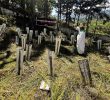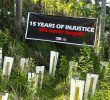Had the Supreme Court proceeded with the mandatory review of this
case, it would have given the five accused opportunities to present
further evidence. It could have ordered to transfer the case back to
the local court for new trial where the accused would have been able
to present evidence to prove their innocence. Should the case have
been transferred to the local court so that the accused were able to
present evidence, including the vital information that was not
considered by the previous court hearing, this could have helped in
the speedy resolution of their case.
However, this seemed unlikely to take place. The further failure by
both the Supreme Court and appeals court to review this case promptly
is cause for serious concern. Since the Supreme Court rejected the
accused’ petition to defer the transfer and now that the case is with
the appeals court for review, the accused and their legal counsels had
already lost domestic remedies to challenge the Supreme Court’s undue
transfer. Thus, the accused and their legal counsel will have to wait
until the appeals court conclude its intermediate review before it is
once again sent back to the Supreme Court for final review. This
procedure would take years.
BACKGROUND INFORMATION:
On 19 to 26 June 1996, days after Colonel Abadilla was murdered, the
“Task Force Rolly”, a special police unit the government created to
solve Abadilla’s murder, have started arresting several persons at
random in Fairview in Quezon City. It is strongly believed that the
arrest of each persons and their subsequent brutal torture in police
secret detention have resulted to the false claims and pointing of
innocent persons as the supposed accomplices to murder.
It was the Department of Interior and Local Government (DILG), which
was headed by then Secretary Robert Barbers, who created the task
force. It is composed of police officers namely Police Chief
Superintendent Hercules Cataluna, Police Senior Superintendents
Romulo Sales and Bartolome Baluyot, and several of their police
officers. Chief Supt. Cataluna and another policeman who are among
the respondents in the complaints of torture and human rights
violations the five victims have filed have already died. Cataluna
was the principal respondent.
On June 24 of the same year, most of the seven accused were presented
to the media supposedly as the killers of Abadilla. It was theorize
that since all of them are residents of Fairview, the supposed motive
of the killing could have been masterminded by Abadilla’s political
rival who also resides in the said area. But this theory was never
proven in the court trial. The five men were accused of conspiring
each other despite the fact that have no mastermind, no motive, price
or reward or whatsoever that could have motivated them to commit the
murder.
The five accused have likewise claimed being brutally tortured. While
in police custody, they were electrocuted, suffocated with plastic
bags, brutally beaten and assaulted, amongst others, forcing them to
admit responsibility to the murder and to disclose their supposed
accomplices. The medical records of the accused were also tampered by
the police who conducted the medical examination to make it appear
that they were not tortured. They declared the wounds were
“self-inflicted” and “no evidence of any external physical injury”
was seen from their bodies.
There are also serious doubts on the physical evidence that were
recovered from the crime scene that reinforced the accused innocence.
It is reported that the supposed murder handguns were never recovered.
The ballistics examinations of the empty shells recovered likewise did
not match to the handguns belonging to some of the accused. The
fingerprints taken from the car the gunmen had use for escape did not
match to any of the five persons accused.
After the court ordered the conviction, one of the accused, Lenido
Lumanog, filed a Motion for Reconsideration and then a Supplement
that strongly argued as their defense reiterating the ABB’s
involvement into the murder. The motion to present additional
evidence and motions for reconsideration and new trial, were however
denied by Judge Salazar in his order on 25 January 2000.










